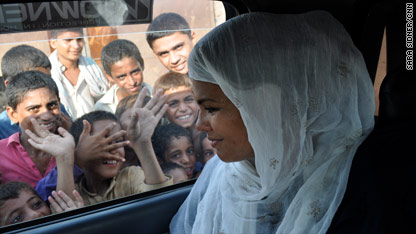How desperate does a mother have to be to get to the point of asking a stranger, a foreigner, to take her baby? This story broke my heart.
One fifth of Pakistan is underwater and one tenth of its citizens have been affected so far by the floods. That is 20 million people. The numbers are so huge it is really hard to grasp. Livestock and crops, pets and other animals are also affected.
So many have been made homeless and it is hot, and they need water and food and shelter, clothing and medicine. They need everything because they have lost almost everything.
But most of all they need people to care.When CNN reporter Sara Sidner went to cover the Pakistani Floods, she spent time with the people there. She describes them as welcoming, warm and friendly, anxious to share what little they had with her.
Pakistani Mom: "Take my baby, she'll have a better life" CNN reporter Sara Sidner sits in a car surrounded by children as she and a crew prepare to leave the flooded Sindh Province in Pakistan.
CNN reporter Sara Sidner sits in a car surrounded by children as she and a crew prepare to leave the flooded Sindh Province in Pakistan.Everyone here is suffering from something. Still, the moment they see us, everyone scrambles to find a suitable place for us. Someone is trying to find a chair for us to sit down. Father Khuda Joti is insisting on giving us tea or sending someone to buy a cold drink. We are guests in his makeshift shelter, and he wants to give us the best of what he has. We cannot bring ourselves to take anything from him. He and his family have lost nearly everything they own.
Although these people are victims of the worst floods in the history of Pakistan, the reporter says that everywhere they went, they were treated the same way. With kindness and generosity.
When we ask about their troubles, the entire clan begins to talk at once. Suddenly we are surrounded by children, women, fathers, uncles, aunts, cousins and grandfathers - all members of the large extended family. They have taken refuge in a small school that the family broke into and turned into an unofficial shelter. They have nowhere else to go.
"We were drowning in the water," one family member says
The people answered questions about what happened to him all talking at once, the reporter says it was difficult to hear them all. But then
One of the women in the crowd asked that I take the tiny baby girl I was cooing at. She said the baby would have a better life with me. I wasn't sure I heard her correctly until the actual mother of the baby girl said it. I stood there silent, my brain churning so furiously it was as if it was looking for the right answer to a test from the Almighty. How am I supposed to answer that question? What is the right answer? Is there a right answer?
I don't know why this story affected me as much as it did. I just cannot comprehend the pain and the suffering of these people.
This is NOT about politics or religion or history. Everything there has changed, and it is now about millions of human beings who we can try to help and show them that people care about them.
My own favorite charity is
Doctors Without Borders because I know they spend all of the money donated to them on the people and their needs. They also usually stop taking donations when they do not need any more.
And
Save The Children have people on the ground there also and do some great work in disaster areas.
Save the Children is working with national, district and local governments and is using all means of transportation available, including helicopters, mules and boats, to send health staff and supplies to communities that have been cut off.
* To date, we have provided relief to more than 37,800 children and adults through medical care and distributions of food, shelter materials and hygiene kits.
* Our team in Kalam distributed 29 tons of food to 316 families in the Swat District. We have also been asked by the World Food Program to distribute food in up to 10 other union councils in Swat. We will also be providing other non-food relief items in Swat.
* Save the Children’s mobile medical teams in Swat, Allai, Dera Ismail Khan and Buner continue to provide primary health services for thousands of children and adults, especially women. We also have stationary medical teams based in Swat. The common illnesses our teams are treating include pneumonia, diarrhea, skin infections and scabies. Over 60 percent of patients are women and children.
* Our assessment teams walked 9 hours to reach isolated villages and organize the distribution of hundreds of tents to families without shelter.
* Save the Children has identified six urgent needs of children and their families that we will address over the longer term: shelter, health and nutrition, education and protection. We will also help families regain incomes and help restore their ability to produce food.
I know many people cannot afford to donate money right now. I cannot give very much. But there are other ways to help. Like writing Diaries and OPs, spreading the word as the news media is not covering this story very well yet. The more people who know about it the more help there will be.